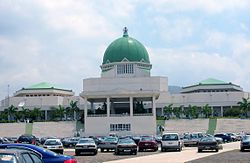Parliamentary elections
The Parliamentary elections was conducted at the National Assembly Complex, Abuja, the federal capital territory, Nigeria. [7]
Senatorial election
The Assembly was inaugurated on 9 June 2015 at around 10.am following the reading of the proclamation letter of General Muhammadu Buhari, the President of Nigeria, who ordered the inauguration of the Assembly. The letter was read by Alhaji Salisu Maikasuwa, the Clerk of the National Assembly. [8] [9] Out of the 59 Senators-elect, only 57 were in attendance, in line with the Senate Rule that stipulated that only two-thirds of the total Senators need to be present to form a quorum. [10] Senator Bukola Saraki was nominated as candidate for the office of President of the Senate by Senator Ahmad Sani Yerima representing Zamfara Central and his nomination was seconded by Senator Dino Melaye representing Kogi West. [11] The clerk called for further nomination but the other aspirant for the office, Senator Ahmed Ibrahim Lawan, representing Yobe North was absent and the clerk asked twice, if there is any other nomination before he drew the curtain to declare Senator Bukola Saraki winner and Senate President-elect of the Federal Republic of Nigeria. [12] He was led to the platform to take the oaths of office and allegiance led by the clerk. [13] Saraki assumed the office immediately and took his seat as the Senate president, while the Assembly proceedings continued. [14] Senator Ike Ekweremadu, the Deputy Senate president of the 6th and 7th Assemblies was re-elected following his nomination by Senator George Thompson Sekibo. [15] Senator Ekweremadu polled a total votes of 54 to defeat Senator Mohammed Ali Ndume, who polled only 20 votes. [16]
House of representatives election
The election of the leadership of House of representatives was also conducted by the clerk. [17] After two hours of voting process, Honorable Yakubu Dogara emerged as the Speaker of the Nigerian House of Representatives by 8 votes having polled 182 votes with 1 vote above the simple majority stipulated by the 1999 Constitution as mended, against honorable Femi Gbajabiamila who polled 174 votes and two ballots were voided. [18] Dogara was sworn in by the clerk, Alhaji Maikasuwa and he assumed office as Speaker of the Nigerian House of Representatives at around 4.45 pm. [19]
This page is based on this
Wikipedia article Text is available under the
CC BY-SA 4.0 license; additional terms may apply.
Images, videos and audio are available under their respective licenses.


